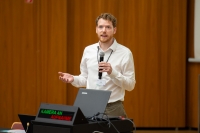The award, which is presented every two years at the VPHi Conference, celebrates excellence in in silico medicine research.

We are excited to announce that this year's VPHi Best Student Award 2024 has been awarded to Finneas Catling from Imperial College London, with his research Bayesian Inversion Enables Personalized Septic Shock Treatment Guided by Noisy Arterial Pressure Waveforms. Finneas is an Anaesthetic and Critical Care doctor, and a Wellcome Trust 4i Clinical PhD Fellow at Imperial College London.
The award, which is presented every two years at the VPHi Conference, celebrates excellence in in silico medicine research.
This year, we received 18 applications from VPHi student members, all of whom had their abstracts selected for oral presentations at the conference. After a thorough review by a panel of experts across various fields, four finalists were chosen based on the strength of their abstracts and their CV. The final decision was made after evaluating their presentations at the conference.
The quality of the finalists' presentations was exceptional. Each of the four finalists, Laura Lafuente-Gracia, Anna Ramella, Julia Musgrave and Finneas Catling, demonstrated remarkable innovation, depth of research, and potential impact of their work in in silico medicine. Their presentations reflected a deep understanding of complex methodologies and a strong ability to communicate scientific concepts effectively.
As the winner of the VPHi Best Student Award, Finneas had the opportunity to present a short version of his research during the Closing Ceremony of the conference.
He explained how septic shock is a life-threatening condition that disrupts the cardiovascular system, leading to a complex and often unpredictable range of changes in how blood circulates through the body. Patients are monitored by doctors through arterial pressure waveforms, which give an insight into their cardiovascular status.
Traditional methods of interpreting these waveforms, which involve looking at their shape “by eye”, can often be challenging, especially when the readings are unclear due to noise introduced by measurement tools like fluid-filled catheters. This is where the innovative system Finneas presented, uses advanced Bayesian inversion techniques to analyze these noisy waveforms and to provide a clearer, more reliable picture of a patient's cardiovascular health.
The system combines several tools to analyze a patient's arterial pressure waveform, even in the presence of noise:
A one-stage and a two-stage approach were tested for analyzing the data, with the two-stage approach proving to be more reliable, reducing errors caused by noisy data and improving the trustworthiness of key cardiovascular measures such as stroke volume, arterial stiffness and blood flow to different organs.
With this approach, it may be possible to reduce uncertainty and help doctors make better-informed decisions, ultimately supporting personalized treatment strategies for patients in septic shock, allowing for tailored interventions such as IV fluid administration, vasopressor, or inotrope therapies.
Congratulations to our winner and all the finalists for their contributions!